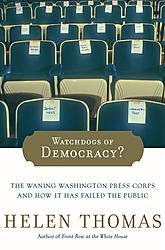Watchdogs of Democracy?
Helen Thomas first came to my attention a few years ago. As Dean of the Washington Press Corps who has been a Journalism icon for 60 years, Thomas traditionally has been offered the first question in deference to her status. However, Bush made no secret of the fact that he did not appreciate the veteran reporter hammering him with tough questions and demanding accountability, and started refusing to call on her. The insult was clear, grave and, to many reporters at the time, a definite warning that difficult questions would not only be unappreciated, but the askers would be punished.
In her latest book, Watchdogs of Democracy?, Thomas traces her career, covering nine presidents, and proves that although this is not the first time a President has had an antagonistic relationship with the press - in fact, she is quite clear about the fact that it is a trait all presidents share - this is the first time the press has seemed completely cowed by an administration, and her book is an often blistering condemnation of both press and president in their failure to act in the best interests of the public.
Thomas comes across as extremely knowledgeable, if a bit dry, when relating the histories of each aspect of political press coverage. The detailed relationship between each president and the reporters who are both in the pressroom and on "body watch" is thoroughly covered, starting with Roosevelt onward. Thomas also devoted a chapter to the different press secretaries, right wing news spinners, historical whistleblowers, her opinions on jailed journalist Judith Miller and almost-jailed Matt Cooper, the FCC, the business of newspapers and the debilitating influence corporations have had on the public's right to know, and whew! I have to say this: While it is a privilege to hear what someone as esteemed as Thomas has to say, this coverage got a little tedious at times. It read like Thomas wrote an outline of what she wanted to cover, and methodically fleshed it out. It was competent and informative, but lacked the spark of passion that is needed to draw in the reader and hook her to the page.
That spark finally appears in the last two chapters, where Thomas writes about her opposition to the war in Iraq and gives homage to individual colleagues she admires, particularly when she lauds outstanding female journalists. It is moving to see a woman who struggled up the ladder to join the Boys' Club treehouse and then make a point of not pulling the ladder up once she gets to the top. One gets the sense that Thomas, when reliving passions past and present, forgot about the outline in her head and wrote from her heart, giving the book the knockout punches it needs.
Her constant quest for the truth and for the American people's right to know it, her brilliance and her courage, and her dedication to her craft end up revealing a reason for the cowed press corps that Thomas never touches in the book: that seeing the current administration treat someone who so valuable as if they had no worth was almost as demoralizing as Thomas' theories that 1.) the reporters kowtowed to the administration out of the fear of being labelled "unpatriotic," and 2.) unpatriotic reporters were no longer supported by their corporate-run papers.
While I can understand how reporters could find that intimidating, I would hope that they would also find inspiration in the fact that an 86-year-old woman is able to freak out any Presidential administration to that degree and really, America really needs more crusty old broads out there swinging away.
_______________________
Watchdogs of Democracy?
by Helen Thomas
2006 by Simon and Schuster
Hardcover, 201 pp
ISBN: 0-7432-6781-8
Monday, July 24, 2006
<< Home
